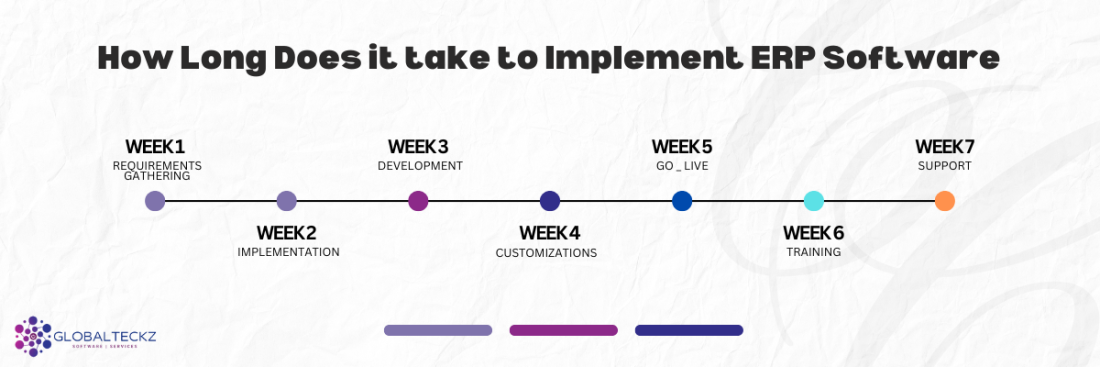One of the most frequently asked questions by clients is: How long does it take to implement ERP solutions? While Enterprise Resource Planning implementation isn’t a one-size-fits-all solution, there are several factors that impact the timeline, including the complexity of the business, the type of software, vendor experience, and the level of customization required.
Enterprise Resource Planning software is a powerful tool that can greatly enhance business processes, streamline operations, and drive growth. However, many businesses struggle with ERP implementation, as studies show that a significant number of projects fail or miss their deadlines.
In this article, we will explore the key factors that influence ERP implementation timelines, break down the expected timelines based on industry types, and provide strategies to reduce implementation time.
Key Factors That Influence ERP Implementation Timelines
Before determining how long it takes to implement ERP, it’s essential to understand the core factors that influence the project timeline:
-
Customization
- Every business has its unique processes, which means ERP software often needs customization to align with those specific needs. More customization results in a longer implementation time. If the software needs to be tailored to multiple business locations, multi-company setups, or specific departmental workflows, the timeline will increase.
-
Type of ERP Software
- ERP systems come in many forms: open-source, proprietary, cloud-based, and industry-specific. Open-source ERP systems like Odoo offer flexibility and cost-effectiveness but require more time for customization and integration. On the other hand, proprietary ERP solutions may have more out-of-the-box functionality but could be more expensive and less adaptable.
- Cloud-based ERP systems can speed up deployment times compared to on-premise solutions. When choosing ERP software, businesses need to assess their requirements carefully to understand how long implementation might take.
-
Vendor Experience
- The experience and expertise of the ERP vendor play a significant role in determining the timeline. Experienced vendors can handle the project more efficiently, reduce implementation delays, and avoid common pitfalls that might occur in less experienced teams. A vendor’s track record in handling similar projects can be a good indicator of how quickly they can execute the implementation.
-
Resources and Team
- The quality of the implementation team is another crucial factor. The project manager, development team, testing and quality assurance teams, and any other resources provided by the vendor must be capable and well-coordinated. Having the right people on board can significantly reduce the time required for ERP implementation.
-
Scope of the Project
- Scope creep is a common issue in ERP implementations. While it’s tempting to implement every module available, it’s essential to stay focused on the critical requirements of the business. Overloading the system with unnecessary features can extend the project timeline.
-
Methodology
- The methodology used by the vendor, whether Agile or Waterfall, can also impact the timeline. Agile implementation allows businesses to use a basic version of the system with essential modules up and running in a shorter time frame (usually within 1 month), while Waterfall requires a more structured approach and longer timelines.
ERP Implementation Timelines Based on Industries
The time required to implement ERP software varies significantly across industries due to different business processes, complexities, and customization needs. Here’s a breakdown of typical timelines based on industry type:
1. Manufacturing ERP Implementations
Manufacturing businesses often have complex processes involving production schedules, inventory management, procurement, quality control, and logistics. Customizing ERP systems to handle these processes takes time.
- Average Timeline: 3 to 6 months
- Factors Influencing Timeline:
- Complexity of production processes
- Multi-location or multi-plant setups
- Customization for manufacturing workflows
- Integration with machines, IoT devices, or other automation tools
Manufacturers typically need ERP solutions that handle raw material inventory, order management, production planning, supply chain management, and shipping. These customizations can lead to longer implementation periods.
2. Trading (Buying and Selling) ERP Implementations
Trading businesses, including those in wholesale and retail, have simpler workflows. They focus primarily on product procurement, inventory management, sales, and accounting.
- Average Timeline: 2 to 3 months
- Factors Influencing Timeline:
- Multi-location or multi-country sales
- Integration with eCommerce platforms or CRM systems
- Customization for procurement and invoicing
Since trading businesses don’t require extensive customization or integration, ERP implementation tends to be quicker. The main focus is on streamlining the purchasing, sales, and inventory management processes.
3. Service Industry ERP Implementations
In the service industry, ERP implementation focuses on project management, customer relationship management (CRM), invoicing, and human resource management. Service businesses may not have as complex workflows as manufacturers, but they still require detailed customer management and project tracking.
- Average Timeline: 3 to 4 months
- Factors Influencing Timeline:
- Project-based workflows
- CRM and service management features or industry they are serving to.
- Integration with time-tracking and billing systems
For service industries, ERP solutions help manage client projects, track resources, and streamline invoicing and reporting processes. Customization is often necessary to align the ERP system with specific service workflows, but the overall timeline remains shorter compared to manufacturing.
How to Reduce ERP Implementation Timelines
While ERP implementation timelines can be lengthy, there are several strategies businesses can employ to reduce the overall duration of the project:
-
Focus on Core Modules First
- Begin with the essential modules that will drive business operations and ensure quick wins. For example, Sales, Inventory, and Accounting can be implemented first, allowing the business to start using the system within a short period. Additional modules can be added in phases.
-
Choose an Experienced Vendor
- Partnering with a vendor that has experience in your industry can drastically reduce implementation time. Experienced vendors can quickly identify potential issues, minimize delays, and ensure a smooth rollout of the ERP system.
-
Adopt Agile Methodology
- The Agile approach allows businesses to begin using the ERP system with core functionalities while simultaneously working on more complex features. This iterative process means you can start benefiting from the ERP system within 1 month, even as other features are rolled out.
-
Use Pre-configured Templates
- Many ERP solutions offer industry-specific templates that are pre-configured to meet the common needs of businesses within a particular industry. Using these templates can save time compared to starting from scratch.
-
Limit Customization
- While customization is necessary to meet business-specific needs, try to limit the number of custom features during the initial phase. Stick to the out-of-the-box functionalities that meet your essential requirements, and save advanced customizations for later phases.
-
Plan for Data Migration Early
- Data migration is one of the most time-consuming aspects of ERP implementation. Begin preparing your data early by cleaning up existing records and ensuring that all data from legacy systems is correctly formatted for import into the new ERP system.
-
Training and Change Management
- Proper training and a clear change management plan will help your team adapt quickly to the new system. Involve your team in the process from the beginning to ensure buy-in and smooth adoption.
Conclusion
ERP implementation is a significant investment of time, resources, and effort. The timeline for successful ERP deployment depends on various factors such as industry, software type, vendor expertise, and customization needs. By understanding these factors and setting realistic expectations, businesses can better plan their ERP implementation and reduce potential delays.
Whether you are in manufacturing, trading, or the service industry, ERP systems can help streamline your business operations. However, it’s essential to choose the right ERP solution, follow a structured implementation plan, and involve key stakeholders throughout the process.
By focusing on core modules first, working with experienced vendors, and adopting agile methodologies, businesses can reduce ERP implementation timelines and achieve a smoother, more efficient rollout.
Read More Articles
- Major Reasons for ERP failure
- Benefits of using ERP software
- Why Open source ERP software is best for Small business
- Main Purpose of ERP software
- Key factors while comparing ERP software for your business








ERP implementations take time, that is where the vendor capabilities comes into the picture. I have even heard that SAP implementation takes more than 3 years. One of my colleage started ERP implementations back in 2009 till now Microsoft dynamics failed to provide proper reporting the basic one – Apart from that the vendor business got acquired by some other organization. there for to reduce the time of erp implementation – one should reduce the customization weight in the coding part else it will increase the pricing as well as the timeline 🙂